2025 Shanghai Auto Show: Is Intelligent Driving Becoming the Unspoken "Voldemort"?
![]() 04/26 2025
04/26 2025
![]() 711
711
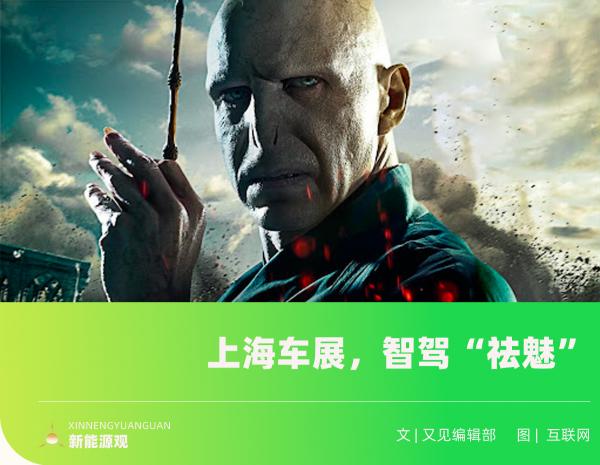
New Energy Perspective (ID: xinnengyuanqianzhan) Original
Full text: 3126 words, Reading time: 10 minutes
At the 2025 Shanghai Auto Show, a subtle sense of "restraint" permeated the air.
On the exhibition stands, lidar was still "embedded" on the roofs of cars, but it was no longer the focus of promotion that auto companies competed to showcase. Phrases like "intelligent driving for all" and "from parking spot to parking spot" were quietly replaced by cautious expressions like "safety redundancy" and "scenario optimization".
Xpeng Motors, which uses "intelligent driving" as its label, placed technologies such as 5C supercharging and AI omnidimensional ecology at the center of its promotion. Li Auto's L6 Intelligent Driving Update, officially announced on April 21, was renamed the L6 Smart Update Version when launched on the first day of the auto show.

Photo/Xpeng G6/G9 - Li Auto L6
Source/Internet, New Energy Perspective Screenshot
Although Huawei noted at the beginning of its Qiankun Intelligent Driving ADS 4 promotional video that "if used on actual roads, the driver still needs to maintain attention and take over control," some media and netizens still disputed the content, leading to its urgent removal on the first day of the auto show.
Just a month ago, "intelligent driving" was still the "hotcake" that auto companies competed to pursue and show off, with some even boasting about deploying advanced intelligent driving to vehicles priced at RMB 100,000 and below.
From once being hyped up to now becoming a sort of taboo, what happened behind the scenes that led to this shift in atmosphere at the "silent" Shanghai Auto Show?
1. Has "Intelligent Driving" Become a Sensitive Word?
This collective silence hit Wang Ran (pseudonym) the moment he stepped into the exhibition hall.
"I visited several exhibition stands, and the sales staff kept introducing the vehicle's endurance and interior design to me," Wang Ran recalled. When he actively inquired about intelligent driving, some sales staff would pause before explaining, while others would awkwardly smile and read directly from their tablets.
"Although the initial reactions of sales staff from different brands varied, I could sense from their expressions that they didn't want customers to bring up intelligent driving. Of course, for those like me who insisted on asking, they probably had emergency training in their responses," Wang Ran said.
Wang Ran indicated that the multiple new energy brands he encountered, including Xpeng, AITO, iCAR, and Zhijie, would emphasize when introducing intelligent driving functions: Currently, all intelligent driving on the market is at Level 2, which can only serve as an aid. Therefore, it is not recommended for drivers to completely free their hands, and current laws and regulations do not allow it.
Xu Man (pseudonym), another consumer, also had a deep understanding of this.
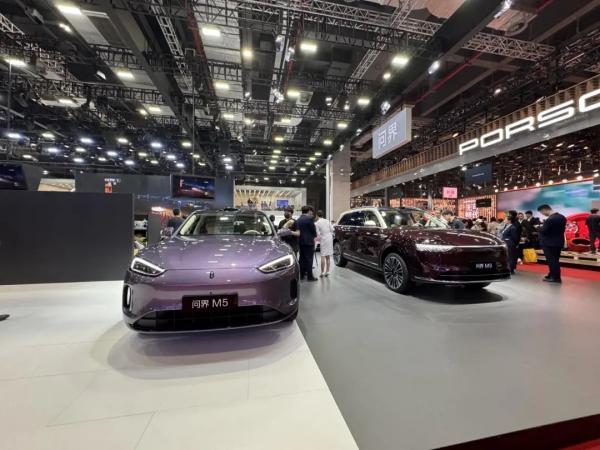
Photo/AITO Exhibition Stand
Source/New Energy Perspective Photo
At the AITO exhibition stand, she had expected to hear about new breakthroughs in intelligent driving technology, but the sales staff focused more on explaining the comfort design and smart cabin of the AITO M5. "When I visited AITO, I wanted to learn about their intelligent driving system, especially after Huawei announced L3 the day before the auto show. But when I asked if the car could drive itself from the community to the parking spot, the sales staff quickly emphasized that national laws, regulations, and policies do not allow it. It's only an aid that can achieve one-click parking from spot to spot, not from the community to the parking spot," Xu Man said.
Xu Man indicated that when inquiring about intelligent driving, she could clearly sense the sales staff's sensitivity and avoidance.
"There are also cases where functions are downgraded and sales pitches are upgraded," Xu Man revealed. A salesperson at a new force exhibition stand claimed that their car could be driven hands-free on urban roads at speeds of up to 90 km/h.
From "high-profile boasting" to "full of the desire to survive," the abrupt change in auto companies' attitudes is related to the dual pressure of public opinion storms and policy "emergency brakes".
At the end of March, a Xiaomi SU7 with NOA intelligent assisted driving enabled was involved in an accident on the highway, resulting in the deaths of three people. This accident triggered consumers to re-examine the safety of intelligent driving. After all, there have been numerous accidents caused by intelligent driving malfunctions or consumers' over-reliance on intelligent driving.
On April 16, the Ministry of Industry and Information Technology issued an announcement on its official website titled "Notice of the First Department of Equipment Industry Holding a Meeting to Promote the Product Access and Software Online Upgrade Management of Intelligent Connected Vehicles," pressing the "pause button" on exaggerated and false marketing of intelligent driving.
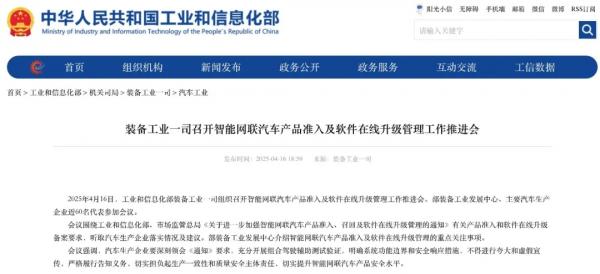
Photo/Ministry of Industry and Information Technology Announcement
Source/Internet, New Energy Perspective Screenshot
According to reports from multiple media platforms, many auto companies urgently revised their promotional copy and related materials for the Shanghai Auto Show after receiving notices of tightened supervision of intelligent driving.
2. Consumers: From "Blind Worship" to "Learning to Disenchant"
At the 2025 Shanghai Auto Show, although auto companies' promotional attitudes towards intelligent driving became cautious, and some even chose to avoid discussing it, the underlying technological competition did not cease. After all, intelligent driving is currently central to all major vehicle models.
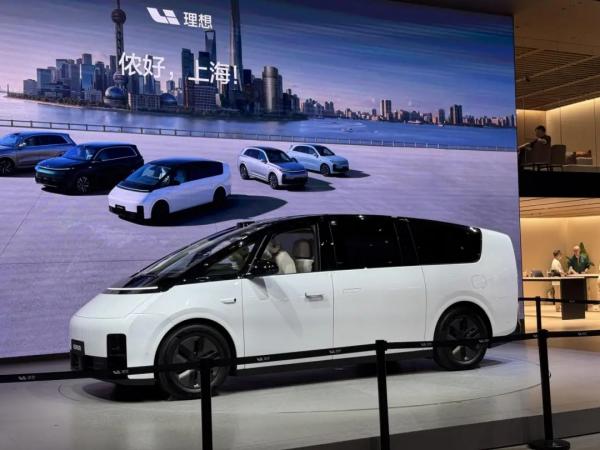
Photo/Li Auto MEGA
Source/New Energy Perspective Photo
Li Auto's flagship model, the new MEGA, upgrades its assisted driving chip from the NVIDIA dual Orin-X to the single Thor-U chip, and the new Li Auto L6 also comes standard with lidar. The AITO M8 is equipped with Huawei's Qiankun Intelligent Driving ADS 3.3, and according to its official plan, it will be upgraded to ADS 4 in the third quarter of this year. The Zeekr 9X adopts the Qianli Haohan H9 solution and is equipped with five lidar and dual Thor intelligent driving chips, with a computing power of 1400 TOPS.
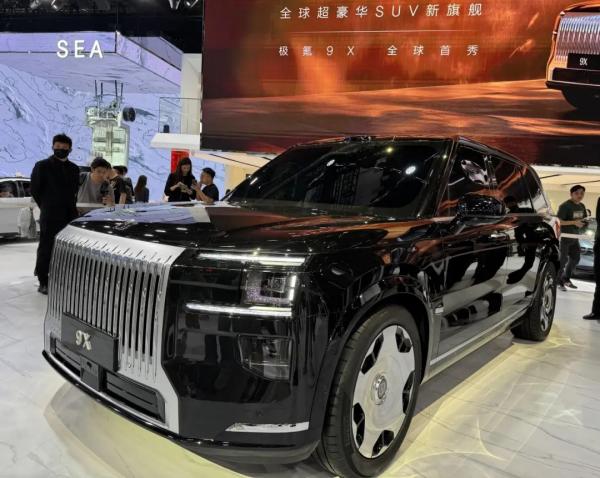
Photo/Zeekr 9X
Source/New Energy Perspective Photo
Thus, from new forces to traditional auto companies, it seems that the term "intelligent driving" has been collectively sealed, but in reality, it is just no longer the main focus of auto companies' promotions.
Yan Qingtian (pseudonym) stood at the Zeekr exhibition stand with mixed emotions.
When purchasing a car in 2024, he paid an additional RMB 30,000 for the "intelligent driving version" of the Zeekr 007. "After experiencing Zeekr's full intelligent driving capabilities during the test drive, I felt it was magical and immediately made a purchase. But now, since the Xiaomi SU7 accident, I'm starting to get scared of intelligent driving. For the past month, whenever I need to drive out, I drive myself," Yan Qingtian said.
Yan Qingtian's feelings are not unique.
Back in 2024, influenced by the bombardment of promotions from various auto companies, consumers' awareness and acceptance of autonomous driving continued to increase. McKinsey's "2024 China Automotive Consumer Insights" report revealed that as high as 76% of users believe that "high-speed NOA" is necessary, 64% believe that "urban NOA" is necessary, and 77% believe that "automatic parking" is necessary.
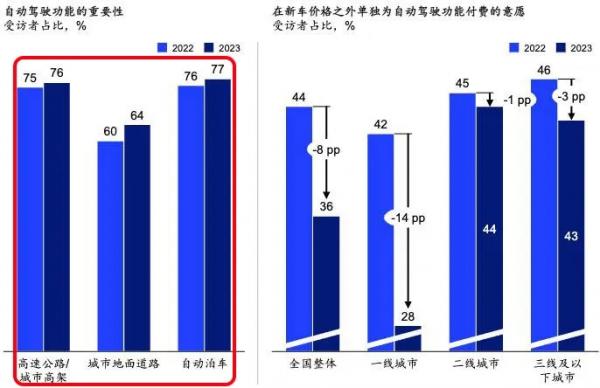
Photo/Partial Data from the "2024 China Automotive Consumer Insights" Report
Source/Internet, New Energy Perspective Screenshot
Most consumers admitted that before the Xiaomi SU7 intelligent driving accident at the end of March this year, intelligent driving functions had always been an important consideration when purchasing a car.
Xu Man recalled, "When I was looking at cars before, the sales staff introduced intelligent driving functions like automatic following and automatic parking, and it felt particularly impressive. It seemed like the car suddenly became high-end and sophisticated. At that time, I felt that cars with intelligent driving were definitely worth buying."
Now, under the public opinion surrounding the Xiaomi SU7 intelligent driving accident and the Ministry of Industry and Information Technology's tightened supervision of intelligent driving, many consumers' perspectives have changed.
"I used to think that intelligent driving was magical, and it seemed like driving would be much easier with it. I didn't consider safety issues too much. But after that accident and seeing the new regulations issued by the Ministry of Industry and Information Technology, I realized that intelligent driving is not yet mature and cannot be fully relied upon. Now, when buying a car, I will pay more attention to the vehicle's safety and stability."
"I was once mesmerized by the various intelligent driving functions promoted by auto companies, thinking that the higher the level, the better. Now I understand that I need to learn to disenchant, not easily be deceived by those promotional pitches, and look at intelligent driving more objectively, understanding its actual capabilities and limitations."
3. After the "Fever" of Intelligent Driving Subsides, How Should Auto Companies Tell Their Stories?
At a new force exhibition stand at the Shanghai Auto Show, a salesperson revealed that although everyone was previously promoting their own high-level intelligent driving, with some auto companies even boasting Level 2.99, these were all just gimmicks in reality.
Currently, intelligent driving on the market, even that of the first tier, is only at Level 2 and has not yet reached true Level 3. Therefore, to ensure absolute safety during vehicle operation, drivers cannot completely let go of the wheel.
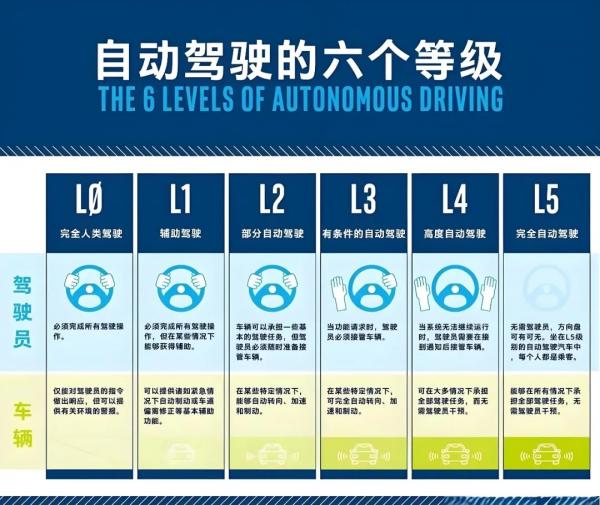
Photo/The Six Levels of Autonomous Driving
Source/Internet, New Energy Perspective Screenshot
It is undeniable that auto companies' pursuit of "technology for all" is not wrong and is a positive direction for promoting industry development. However, if during the technology iteration process, they excessively rely on the concept of intelligent driving for marketing and use it as the only "trump card" to attract consumers, it will not only mislead consumers' rational understanding of intelligent driving functions but will also eventually backfire and lose consumer trust.
Many consumers admitted that they were once attracted by auto companies' highly appealing intelligent driving promotions, resulting in expectations for intelligent driving technology that exceeded reality and even blind trust.
According to survey data from authoritative institutions, over 80% of intelligent driving-related accidents in 2024 involved drivers' excessive reliance on the system.
For example, in October last year, a new energy vehicle traveling on the Beijing-Hong Kong-Macao Expressway crashed into a construction and renovation section because the owner turned on the intelligent assisted driving system and closed their eyes to rest. In December, the owner of a new energy vehicle rear-ended a stationary cement pump truck at a speed of 120 km/h while the high-level intelligent driving system was engaged.
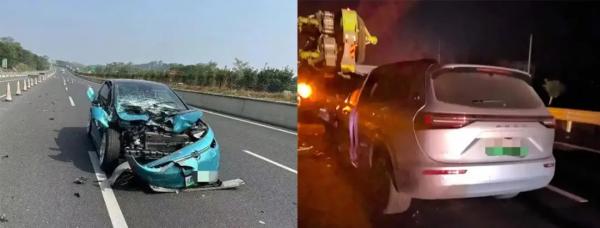
Photo/Vehicle Accident Scene
Source/Internet, New Energy Perspective Screenshot
Undoubtedly, when negative news about intelligent driving accidents frequently appears, it will cause consumers to worry and feel anxious.
"Since seeing those news reports about intelligent driving accidents, I've been on edge. Now, I have concerns about models and brands that have been involved in intelligent driving accidents, and I will probably exclude them when I plan to replace my car in the future."
"I was originally quite looking forward to intelligent driving technology bringing a more convenient and safe travel experience, but now it seems that the technology is far from mature, and auto companies' promotions are so unreliable. I really don't know what to do."
Based on this, in the future, even if the double pressure of public opinion heat and tightened supervision subsides, auto companies should not repeat the same mistakes and continue to exaggerate or falsely promote their intelligent driving functions. Instead of pursuing marketing gimmicks, auto companies should be more pragmatic, focus on technology research and development and product refinement, and concentrate their core competitiveness on improving the safety, reliability, and practicality of intelligent driving systems to truly enhance the user experience.
Many consumers who plan to purchase a car in the near future said that intelligent driving is just the icing on the cake, and the safety, practicality, and service guarantee of the vehicle are the core factors that determine their purchase choice.
"As one of the essential tools for travel, the level of safety equipment will directly affect the driver's personal safety. Therefore, when I buy a car, I will pay more attention to whether it has a clear reverse camera, a stable braking system, etc."
"When choosing a car, I will not only consider the configuration but will also prioritize brands with extensive service network coverage and fast response times. I would rather spend a little more money for peace of mind."
The shift in the promotional direction of intelligent driving at the 2025 Shanghai Auto Show may only be the beginning. After all, in this long-distance race in the new energy sector, only those auto companies that always take safety as their foundation while maintaining the vitality of technological innovation can steadily advance in the dynamic balance between the two.







